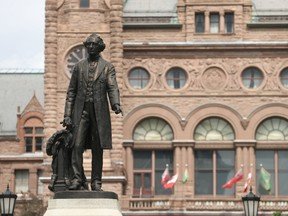Instead of open and uniform and attitude, historians say, ‘The DDSP process is opaque, rushing and secret’

Article content
A team of key Canadian historians intervene with the Ontario Premier Duck Ford, and the Toronto District School Board from its three schools.
The Canadian Historical Education Institute (CIHE) has written to the DDSP because it has announced the results of a recommendation to change names. CIHE plans to present a presentation before the Board’s Planning and Priority Committee on Wednesday to insist that the process should be reviewed before the Board’s final voting.
Advertisement 2
Article content
Speaking on behalf of the CIHE meeting at the committee meeting, the historian JDM Stewart said, “This will be a hard wave to return, but you have to try more.”
Instead of open and uniform and approach, CIH says, “The DDSP process is opaque, rushed and secret.”
As a 30 -year -old teacher, Stewart says he has seen the concentration of Canadian history from political and military topics on social progress and marginalized groups. He says that it is necessary to calculate, there is no big picture.
That gap comes to light, Sir John A. Important historians, such as McDonald, are reviewed for their mistakes, without looking at their intentions and achievements. “McDonald is not perfect, but he is a visionary observer who brought life to Canada.”
History teaching “has become very political. A lot of teachers are afraid to speak. There is a lot of self -censorship. “Even if a teacher simply says something inadvertently, they can call the mat, he says.
He describes the latest notion of the famous Canadian historian Margaret Macmillan, a CIH contributor, and the main historians are now portrayed as “caricatures – hero or villain.”
Article content
Advertisement 3
Article content
But Stewart says, “We must protect from judgment based on today’s values.”
As a country, Canada matured enough to embrace the sins and virtues of our historical leaders, he added.
The DDSP announcement on January 27 said the Board’s decision to make name changes was “based on the potential impact on colonial history, their involvement with the anti -racist and oppressive systems.”
Responding to this, the CIHE letter to the DDSP’s chair and trustees on February 6, outlines the tradition of individuals who have been reviewed, argues for a second view before the final vote of the entire board.
Here are the abbreviations of the historic people in question provided by CIHE:
Canada’s first Prime Minister Sir John A. McDonald is widely regarded as one of Canada’s main architects, and has written most of the rules that define the federation. It is widely known that he led the Construction of the Canadian Pacific Railway, which brought British Columbia into the lap, and established the country from sea to sea. “McDonald served as Prime Minister of Canada in its first twenty -four years.”
Advertisement 4
Article content
Ecardon Rarson was a Methodist Minister and educator. When he was the chief superintendent of schools between 1844 and 1876, he was the chief superintendent of schools for Ontario, he was behind the creation of Ontario’s public school system. ” “He was a missionary among the tribal people of the Credit River. He learned to speak Ojibway and became a respected teacher among the people of Ojibway.
Henry Dundas was a minister in the Cabinet of British Prime Minister William Pitin. He is known for his anti -slavery position. He appointed John Graves Simko as the first Lieutenant-Kavarner of Upper Canada, and then introduced “the first law of the entire British Empire to control slavery in the upper Canada.”
In the meantime, CIHE argues that after an open and transparent process, after an open and transparent process, after the open and transparent process, which provides all partners hearing opportunities, the school should be renamed only after an open and transparent process.
In February last year, the CIHE school boards issued “policies for name and renamed” to provide guidance to municipalities and similar public organizations.
Advertisement 5
Article content
The policies are as follows:
A) Any conclusion of renamed and renamed should only occur in exceptional circumstances and be based on installed and clear criteria;
B) advice between all groups affected by change;
c) advice obtained and received from other experts, including education and historians;
d) Review of a transparent review to ensure that all affected parties have confidence in the end.
Managing Director Alan Williams says the CIHE has not yet been answered from TDSB to the letter for February 6.
Recommended from the editorial
Our website is the location for the latest braking news, exclusive scoops, longrades and provocative commentary. Please Bookmark National Post.com Register to our daily newsletter, Here.
Article content















